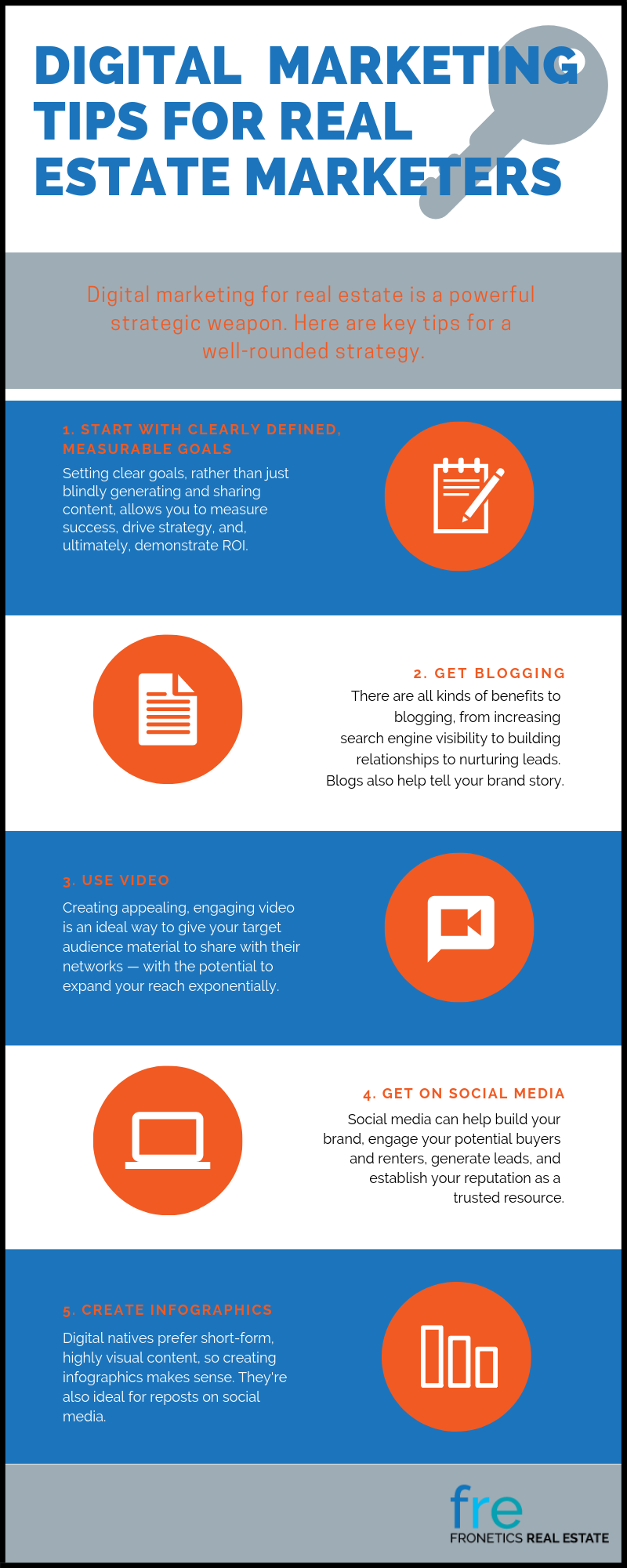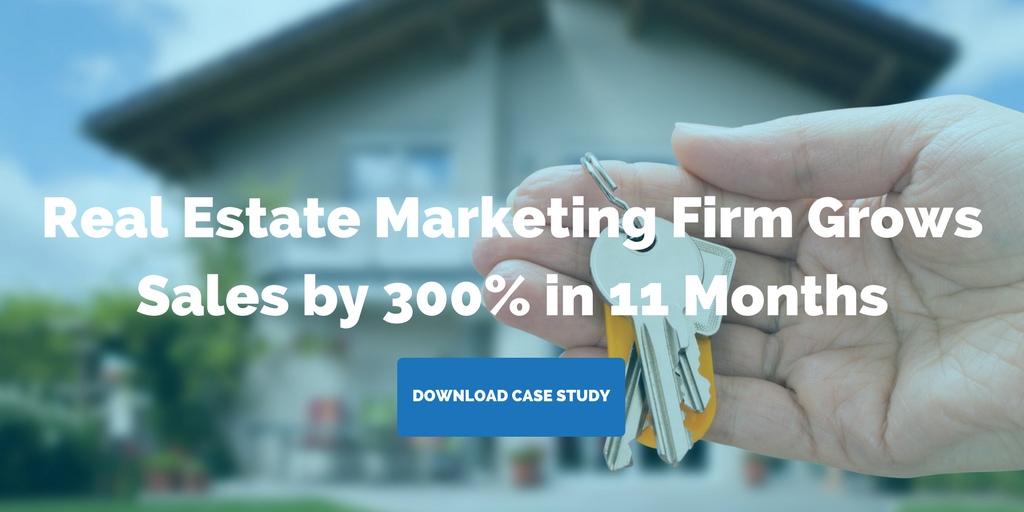Your search results for "Social media ads"

10 Must-Follow Blogs for Real Estate Marketers
We recommend these blogs for real estate marketers who want to learn more about content marketing, social media, the real estate industry, and more.
One of the most exciting aspects of real estate marketing is that there’s always something new to learn. As technologies constantly evolve, there is an ever-growing field of ideas being generated and discussed—and every real estate marketer should be a part of it!
We’ve compiled this list, letting you in on 10 of our favorite blogs that we think you should be following, too. You’ll find information and ideas about overall best practices, social media use, writing effective content, and more.
10 must-follow blogs for real estate marketers
1) HubSpot Marketing
HubSpot Marketing is a phenomenal resource for all content marketers, including real estate marketers. It covers everything you need to know to become a marketing whiz. Topics include SEO, blogging, social media, lead generation, email marketing, lead management, analytics, and more.
2) Social Media Today
Social Media Today is a great go-to resource for all things social media. The blog frequently features insights from leaders in the field. And SMT’s team of influencers covers topics including social media developments, trending, social marketing, digital strategy, and content marketing.
3) Propmodo Real Estate
Propmodo Real Estate is the place for cutting-edge insights into how technology is changing the way commercial real estate is acquired, managed, and used. This multimedia site follows people, practices, and tools that are shaping the business of real estate.
4) RIS Media
RIS Media’s blog is a good resource for practical, actionable marketing tips. You can find articles that guide you through things like landing pages and community pages, as well as wider insights and market reports.
5) BombBomb
Another real estate-specific site, BombBomb’s blog is dedicated to building relationships through video to create more opportunities in email, text, and social media. It’s particularly strong on email marketing, which is still the most profitable form of marketing online.
6) Quicksprout
While he doesn’t focus specifically on real estate, Quicksprout writer Neil Patel shares excellent advice for getting and converting traffic. It’s not difficult to find actionable ideas and apply them to real estate marketing.
7) Geek Estate
Another good choice for the tech-savvy marketer, Geek Estate focuses on what’s happening in real estate technology — for example, the changes happening with Zillow and Trulia. This is a great resource for being on the cutting-edge of upcoming trends.
8) OutBound Engine
A good resource for the nuts and bolts of lead generation tactics, OutBound Engine has practical tips and catchy, readable material.
9) Backlinko
Backlinko is your new go-to for all things SEO. Since real estate marketers often struggle with search engine ranking, Backlinko offers real estate-specific SEO articles chock full of great advice.
10) Get Vero
GetVero is another great choice for email marketing ideas. While not real estate-specific, this blog details newsletters, drip sequences, follow-ups, and more.
What blogs for real estate do you follow?
Related posts:
- A Visual Guide to Social Media Posting Frequency for Real Estate
- 4 Types of Content You Need to Sell Real Estate (Besides Listings)
- 4 Real Estate Marketing Trends 2018
Your search results for "Social media ads"

Infographic: 5 Tips to Make Digital Marketing for Real Estate Count
Digital marketing for real estate is a powerful strategic weapon. Our infographic gives you some key tips for a well-rounded strategy.
Highlights:
- 88% of all home buyers use the internet to collect information, and for 43%, an online search is their first step.
- When you kick off digital marketing for real estate, setting clear goals, rather than just blindly generating and sharing content, allows you to measure success, drive strategy, and ultimately, demonstrate ROI.
- Video is an ideal way to give your target audience material to share with their networks — with the potential to expand your reach exponentially.
As the realm of marketing has undergone a seismic shift in the past decade, digital marketing for real estate has taken off. According to the National Association of Realtors, 88% of all home buyers use the internet to collect information, and for 43%, an online search is their first step. Real estate marketers are increasingly targeting their efforts on digital media, and content marketing is one of the best ways to do this.
Our infographic below represents our favorite digital marketing tips for real estate marketers. Read on for ways you can use this powerhouse tool to market your brand and properties.
Digital marketing for real estate — 5 tips
1) Start with clearly defined, measurable goals
Effectively selling or leasing property requires a comprehensive, data-driven approach to marketing — which means starting with clearly defined, measurable goals. Are you looking to generate more leads? Raise brand awareness? Grow your social media presence? When you kick off digital marketing for real estate, setting clear goals, rather than just blindly generating and sharing content, allows you to measure success, drive strategy, and ultimately, demonstrate ROI.
2) Get blogging
Blogs help you sell real estate. Period. There are all kinds of benefits to blogging, from increasing search engine visibility to building relationships to nurturing leads. The more you publish, the higher you’ll rank with search engines. And every time you publish a blog post, you increase the chances that a user searching online for real estate will find your website.
Blogs also help tell your brand story. They help buyers imagine themselves in your space. They nurture leads and build trust among potential buyers. In a recent audit of a client’s website, we found that people who read the blog converted at an almost 30% higher rate than other web traffic. That’s significant.
3) Use video
If you’re a frequent reader of our blog, you’ll know that we’ve been writing about the astronomical rise of video in real estate marketing for a while now. We can’t stress it enough: video is here to stay, and it’s time your business starts embracing it as a highly effective content marketing tool.
Part of what makes video such an appealing form of content is its inherent shareability, which drives organic traffic. Getting your content and properties out to your base audience is one thing but empowering that audience to be your ambassadors is a huge next step. Creating appealing, engaging video is an ideal way to give your target audience material to share with their networks — with the potential to expand your reach exponentially.
4) Get on social media
Real estate is a people business. That’s why you should leverage a marketing tool that is also all about people: social media. If you have not begun developing social media strategies for your real estate business, now is the time to get started.
Consider for a minute that in 2017, 81% of Americans had at least one social media profile. And the numbers are projected to continue skyrocketing: by 2020, 200 million people just in the U.S. are estimated to be on social media. Used wisely, social media can help build your brand, engage your potential buyers and renters, generate leads, and establish your reputation as a trusted resource.
5) Create Infographics
Infographics can be one of the most effective mediums for digital marketing for real estate. We know that digital natives, who make up the majority of real estate buyers today, prefer short-form, highly visual content. So, infographics make a lot of sense when it comes to speaking their language. Infographics are also prime candidates for reposts on social media.
Since the text in infographics isn’t readable by search engines, you can make the most out of your content and bump up your SEO by including a transcript of your text with your graphic, ideally at least 350 words.
Final thoughts
Online searches have changed real estate marketing for good. In fact, the possibilities that digital marketing offers are varied, constantly evolving, and exciting. Savvy real estate marketers are using quality content to raise brand awareness, improve SEO, build relationships, and generate leads.
Related Posts:
- A Visual Guide to Social Media Posting Frequency for Real Estate
- 10 Social Media Statistics for Real Estate Marketers 2018
- 10 Quick Ways to Grow Brand Awareness
Your search results for "Social media ads"

Get Personal: the Human Side of Real Estate Marketing
Using emotion in your real estate marketing to appeal to buyers can help you sell homes more easily and effectively.
Highlights:
- Emotions often strongly influence buying decisions when the time comes to purchase a property.
- There’s a big difference between listing facts about a property and using an emotion-driven, storytelling style that will appeal to potential buyers.
- If you want to take your real estate marketing efforts from dry to extraordinary, using emotion is the most effective tactic for connecting with potential buyers.
Real estate marketing comes in a number of forms. As a marketer, you may go out of your way to create a stunning website, maintain social media pages across a range of accounts, and even send out advertisements to help drum up interest in your available properties. If you want truly spectacular marketing for your available properties, however, there’s one key way to take your efforts to the next level: get personal.
Appealing to the Emotions
Buying a home is a very personal decision. Many people are eager to make a move: to find the perfect home for raising a family or start a new life with a partner. Emotions often strongly influence buying decisions when the time comes to purchase a property — and as a real estate agent, your marketing should take advantage of that. By appealing to your buyers’ emotions, you can often sell houses faster.
Try some of these strategies:
Take a look at the property from an emotional perspective.
Imagine who might be seeking to live there. Is the property a single-family home? An apartment building? The perfect space for a business just starting out? Once you have a good idea of who might want to purchase the property, create a clear buyer persona. Imagine what is important to those individuals and how they could be influenced to fall in love with the property.
Include the appeal to emotion in your ads.
This is especially effective on your social media ads and emails, but it can be used anywhere. Use your imagination and encourage potential buyers to picture themselves in the property. Include imagery that can help buyers imagine what it might be like to live there. This might be as simple as taking a walk down the convenient sidewalks out front or watching the kids play in the backyard.
Use the right language.
You have a good idea of what buyers want to know about the house: the number of bedrooms and bathrooms, the size of the garage, and whether it has a fireplace, for example. There’s a big difference, however, between listing those things as facts and using an emotion-driven, storytelling style that will appeal to potential buyers.
Effective Marketing: Appealing Through Others
Your marketing efforts help you connect more effectively with your buyers. But it isn’t just your advertisements that will showcase your properties. Take time to get to know the neighbors around your properties. Often, they can be your most effective tools. Do they have a friend or family member looking for a place to live and who would consider one of your listings?
The neighbors are also an incredible source of information. What makes them love living here? By chatting with the neighbors, you don’t just encourage them to share information about the property with potential buyers, you also glean valuable information from the exchange, which helps you market more effectively.
If you want to take your real estate marketing efforts from dry to extraordinary, using emotion is the most effective tactic for connecting with potential buyers. Buying a home, in particular, is a very emotional decision for most buyers so take advantage of that emotion as you create your marketing campaigns to help them fall in love with your listings.
Related posts:
- 3 Social Media Mistakes Real Estate Companies Still Make
- Using Messaging Platforms for Real Estate to Deliver Content
- Infographic: Real Estate Social Media Marketing Strategies
Your search results for "Social media ads"

10 Quick Ways to Grow Brand Awareness
If you want to grow brand awareness, or ensure potential buyers know your property exists, try these strategies.
If you’re building a new property, or just rebranding an old one with a bad reputation, you want to get the word out quickly about what your project is all about. It’s called brand awareness.
For real estate developers and property management companies, brand awareness means that your target buyers (or tenants) know that your property exists. They understand the lifestyle that the property offers.
To grow brand awareness requires a proactive approach. Some companies turn to traditional methods, such as billboards. But it’s important to think about your digital strategy, as well, since the vast majority of real estate research occurs online.
Check out these 10 ways to use content marketing to grow brand awareness quickly.
10 ways to grow brand awareness — fast
1) Establish your brand.
To grow brand awareness, you must first have a brand. This, generally, is the message of your property describing the kind of lifestyle it affords people who live there.
You need concrete creative assets, like a logo and images, and other non-tangibles, like taglines and a defined look and feel. You also need a consistent brand message, which you should develop based on detailed buyer personas laid out as part of the brand-creation process. If you’re selling luxury condos, for example, all of these assets, the tone and voice of your marketing collateral, and even the platforms you decide to participate in should reflect a sense of sophistication and elegance.
Take the time to develop your full brand story, so that you have something (a lifestyle that transcends brick and mortar) to sell to prospective buyers and renters.
2) Start a blog.
You might think that it seems silly to keep up a blog for your property. Who would even want to read it? But a blog can actually help you sell real estate by increasing the amount of traffic search engines send to your website.
The more you publish, the higher you’ll rank with search engines. And every time you publish a blog post, you increase the chances that a user searching the internet for real estate will find your website.
Blogs also help tell your brand story. They help buyers imagine themselves in your space. They nurture leads and build trust among potential buyers. In a recent audit of a client’s website, we found that people who read the blog converted at an almost 30% higher rate than other web traffic. That’s significant.
3) Become a resource.
Bear with me on this one. But I’ve seen this work many, many times.
Content marketing is all about being a trusted resource for your audience. Ditch the blatant sales pitch in your content and think about how you can help your target buyers instead.
Offer guidance on purchasing a home, information about your property’s neighborhood, or tips on upcoming events in the area. You’ll build trust with your current audience and provide them with content they’re more likely to share with their friends and followers. And that is how you grow brand awareness.
4) Make sharing easy.
This is a great way to let your successes go to work for you. Make it easy for your audience and followers to share your content with their networks. Give them sharing options for email, social media — heck, put share links on anything and everything. Social media is a powerful tool in selling real estate. Don’t underuse it.
5) Start content partnerships.
Again, this is all about leveraging other people’s audiences to spread the word about your property and brand.
Reach out to local real estate media sites and blogs to see if you can author a post for them. See if a local interior designer or financial planning professional would like to write a guest-post series for your blog, and ask them to share it on their social media accounts. Basically, create two-way content partnerships where you will ensure that your brand’s name will come across the screens of an influencer’s audiences.
6) Partner with local businesses.
By its nature, real estate is a location-oriented industry. You can partner with businesses in your area to hold seminars or festivals, sponsor sports teams, and donate to charity events.
This works in the digital world as well. On social media, promote the opening of new neighborhood restaurants, and congratulate nearby businesses when they win local best-of awards. Join online charity challenges to support local causes. Build your digital network of local businesses and organizations so that your brand becomes synonymous with the neighborhood wherever locals browse online.
7) Hold social media contests.
Everybody loves to win a contest. Use your social media platforms to create contests in which followers submit a photo or video, and let other users vote for their favorites. Contestants will share the link with their networks, and your brand awareness grows exponentially.
8) Try paid social advertising.
Facebook and Twitter ads are relatively cheap, and both platforms do a great job of making sure your content gets to your target audience. You can set metrics, and customize your preferences for targeted audience in a huge variety of ways.
9) Leverage influencer marketing.
Think beyond buyers themselves. Who influences them when it comes to making major purchases? Beyond family, financial professionals, interior designers, and, of course, brokers represent strong spheres of influence in the real estate space.
Create targeted campaigns to reach these influencers via email, social media, and digital advertising. Getting your name in front of them is one step in the direction of getting your brand on potential buyers’ minds.
10) Get visual with your content.
I mentioned blogging before as an excellent way to drive traffic to your website. But don’t stop with just words.
Virtual tours, infographics, videos, and other highly visual media are not only great for engaging your current audience. They’re also more likely to be shared by your followers with their networks. Again, when people share your content, you grow brand awareness.
How do you grow brand awareness for your properties?
Related posts:
- 4 Ways a Blog Can Help You Sell Real Estate
- Social Media Trends for 2018 Real Estate Marketers Need to Know
- What Metrics Should You Track in Real Estate Marketing?
Your search results for "Social media ads"

How to Measure Brand Awareness: A Guide for Real Estate Marketers
If you want to measure brand awareness for your property, use these 4 metrics, which indicate if prospective buyers or renters know about it.
When it comes to selling property — particularly luxury properties — growing brand awareness is an important goal. Prospective buyers need to know that your property exists and that it can provide the kind of lifestyle they’re looking for.
Measuring how well you’re doing at getting the word out about your brand and property/properties is critical to optimizing your marketing strategy. But measuring brand awareness can be tricky.
To help you quantify the results of your efforts, here are 4 metrics that indicate that you’re building brand awareness.
4 metrics to measure brand awareness
1) Social media reach
The reach of your social content has a direct impact on your brand awareness. As your social media reach grows, so does your potential brand audience.
SharedCount is a free online tool that allows you to track the number of times a piece of content has been shared on social media, including Facebook, LinkedIn and Google. It’s an easy way to get basic information about your social reach, so you can spend less time tracking tweets and more time producing your content.
2) Brand mentions
There’s a great deal of value to be gained from monitoring discussions about your brand and properties online. Tracking brand mentions can lead to honest feedback and objective insight from potential buyers.
There are several options you can use to track brand mentions. We prefer the convenience of Google Alerts, which allows you to easily set up a custom alert.
Or Hootsuite can track brand mentions, as well as specific keywords and phrases, (like individual properties or neighborhoods) across all of your social media feeds.
3) Blog shares
By adding a share bar to your blog posts, you make it easy for readers to share your blog content on social networks, spreading awareness about your content and your properties through the amplifying effect of social media.
These share bars are easy to set up and even easier to monitor. By measuring your average number of shares per blog, you can track what content your users are drawn to and what pieces fall flat.
4) Search volume
One of the main sources of traffic for most websites is through simple searches. If people are searching for your company or properties, that’s a pretty solid indication that they are aware of your brand.
Using online tools, such as Google AdWords or Moz, you can track the searches for your listings, blogs, social media platforms, and any other variation that you find useful. These tools are free, easy to use, and perfect for determining if your brand is popping up when potential buyers are searching.
How do you measure brand awareness?
Related posts:




